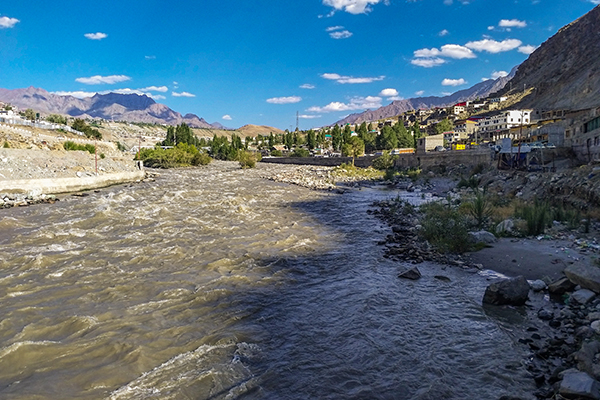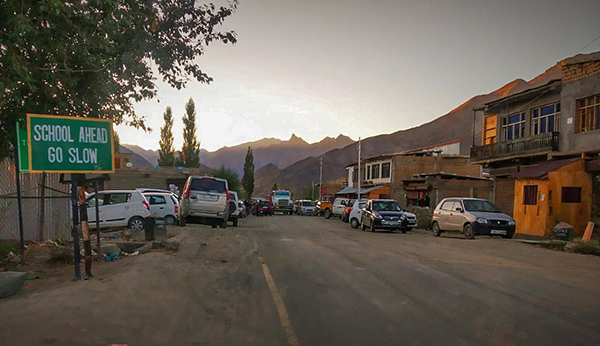The unmaking of Kargil town

We only have to look a century in the past to realise the true beauty of Ladakh. Till as recently as 100 years back, Ladakh had snow-laden mountains, thick juniper forests, clean blue rivers flowing through pristine valleys and wild animals and humans thriving together. In this vast landscape, our wise ancestors chose specific spots for their homes. These homes were made with natural material and south-facing, which enabled them to harness the warmth of the sun. These ancestors toiled to flatten lands for cultivation where they planted local crops while also tending to their livestock. They also framed rules of where houses were to be built. For instance, houses were clustered together for warmth and security. They were never located on the valley floor or on the shady side of mountain slopes, where they would face greater risks of rock-slides and floods. Ladakhi culture is founded on such practical wisdom and a spirit of interdependence between humans and with nature.
In this regard, Kargil had great potential of being developed as a hill resort town for people to recover from the ills of modernity and the heat of the plains. Initially, change was gradual and systematic, which would have resulted in the organic growth of Kargil town. However, sudden economic boom resulted in an avalanche of changes. The resulting prosperity led to an abrupt shift in the general attitude towards the environment. This is evident in haphazard and unplanned construction of houses, hotels, and shops with little regard to topography and time-tested wisdom of our ancestors. This has not only increased our vulnerability to natural disasters, it has also transformed the town into an eyesore. We now have ugly buildings constructed on the best agricultural lands. We no longer have fruit orchards and open spaces, which have been sacrificed on the altar of greed.
We now have a substantial part of Kargil town’s population living in congested and unplanned neighbourhoods that lack basic amenities. We do have various rules and regulations for constructions but the local administration has been lax in enforcing them. As a result, permissions for construction have been granted easily and structures have been built without any planning or foresight.
The town is blessed with a perennial river in the form of the Suru. There were plans to create a beautiful walkway along its banks similar to Srinagar’s Boulevard road. I still remember the open spaces and cultivated fields along the banks of the Suru during my younger days. This area could have been developed into a beautiful crescent-shaped open space or even a public market. It is important to keep the aesthetics in mind, while still meeting practical needs of the town. Instead, of a promenade with street lights, craft shops, cafeterias, and open restaurants, the whole stretch has become a hub for meat shops, timber sellers and hardware shops. Similarly, Kargil town has a beautiful village called Poyen across the Suru. It was once considered the lungs of the town and was a soothing sight in the summer. This village has slowly turned into a slum area, with narrow streets and shabby buildings.
There is a growing demand for residential space in Kargil town due to the influx of people from rural areas for employment and education. Unfortunately, government schools in rural areas are still not at par with their counterparts in the town or with private schools.
This disparity in access to quality education is hurting our society in multiple ways. In addition to adding pressure on the town’s resources, it is also evident in the lack of civic sense amongst the populace. In addition to the government, the common people also bear responsibility for ensuring basic amenities in their neighbourhoods, including roads, water, emergency access, open spaces and playgrounds etc. Quality education is the main pillar of any society. In fact, South African leader Nelson Mandela famously stated, “Destroying any nation does not require use of atomic bombs or the use of long range missiles. But it only requires lowering the quality of education and allowing cheating in examinations by students…The collapse of education is the collapse of the nation.”

We need to develop a thought out plan for housing colonies that adheres to guidelines, rules and regulations. The plan must be developed through consultations of town planners and residents after weighing risks and advantages for each site in the larger landscape. Unfortunately, all these steps have been stubbornly ignored and Kargil town has been disfigured beyond recognition. For instance, we have a beautiful plateau called Kurbathang. It was a deserted and arid area, till a water canal was built to transform it into lush plateau. I still remember when His Holiness the Dalai Lama visited Kargil for the first time when the plateau was a desert. When he visited the area once again some years later, he admired the transformation and commented, “This is what real prosperity means!” This beautiful plateau is now being endangered with haphazard development due to the lack of planning.
There is little hope for the future of Kargil town given the current divisions that exist in society. Kargili society is unnecessary divided due to the political aspirations of two religious schools; Islamia School, Kargil and Imam Khomeini Memorial Trust. The resulting divisions run deep through every section of Kargili society. These divisions are most obvious during elections, which are meant to improve governance but devolve into a power struggle every time.
These divisions are fairly recent and are sustained by vested interests who seek to use them to access power, resources and patronage. Unfortunately, the younger generation in Kargil have now become enmeshed into this political division to the detriment of society at large. Ironically, there is actually no real theological difference between the two camps. However, the schism continues to be sustained by self-serving people despite the negative impact it has on our social fabric.
This situation reminds me of a famous Persian proverb, “Do muroq-ra jang baaz, teer gher ra faida ast” (The hunter benefits when two wild birds fight). The wisdom of this proverb is constantly being played out in Kargili society, with opportunistic and self-serving people taking advantage of these divisions. All of this has contributed to the haphazard development of Kargil town.
However, the situation can still be remedied. Any corrective measures will be challenging but not impossible. First of all, we need to eliminate unnecessary social divisions and build consensus by including every section of society irrespective of their political, religious, gender, class affiliations, Social divisions will only lead to the collapse of our society. Our leaders and society members must be compelled to repair such divisions, especially the two dominant religious camps that have torn the society apart. This will be a difficult challenge but it is not impossible. Here each member of our society has a big role to play as a leader is only as good as the people he or she leads, which is evident in another famous Persian proverb, “Awaaz e khalq, naqaara e khuda” (The voice of the people is the voice of God). We thus need to hold our leaders accountable for their actions. This will be the first step in the herculean task of rescuing Kargil town from oblivion. The prosperity and unity of our society will be manifested in the growth of our towns and villages, where the people once again follow rules and respect the wisdom of our ancestors.
Text by Dr. (Kacho) Akbar Khan
Photographs by Dr. (Kacho) Akbar Khan and Kacho Sohrab Khan
Dr (Kacho) Akbar Khan is a retired Ear, Nose and Throat (ENT) specialist and is based in Kargil.
